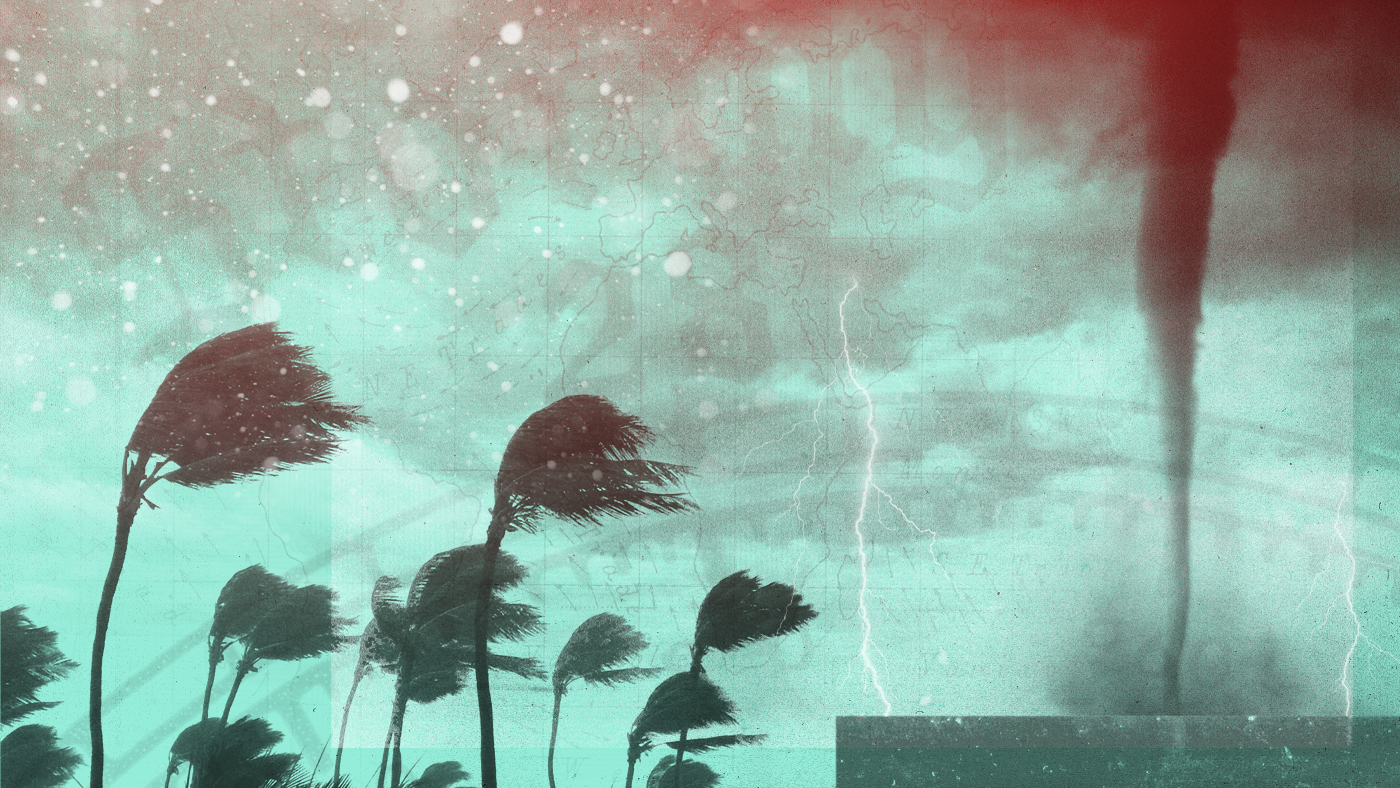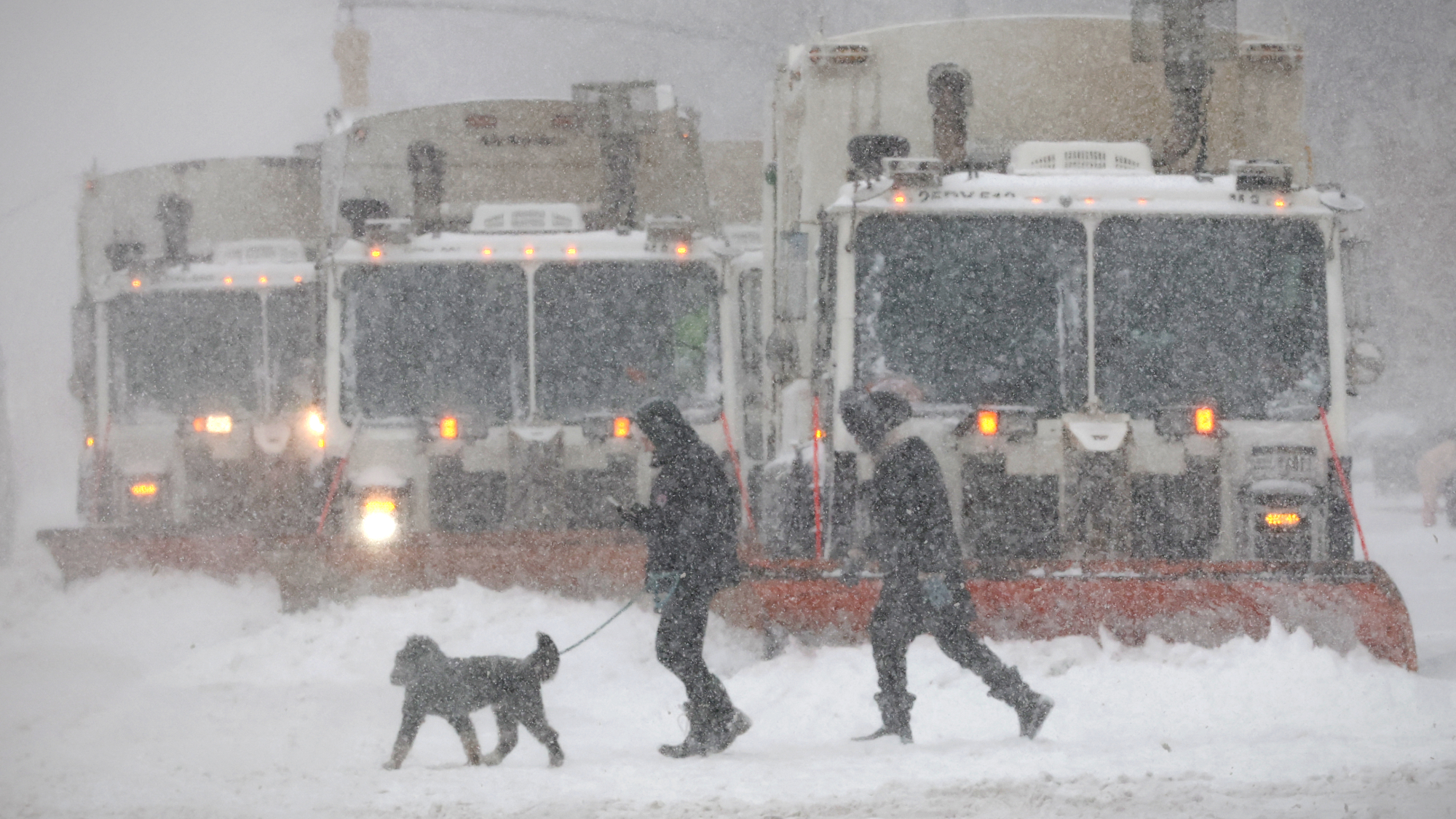Extreme weather events in the last year
Extreme weather events are becoming more common thanks to climate change, and are 'affecting every corner of the world'


A free daily email with the biggest news stories of the day – and the best features from TheWeek.com
You are now subscribed
Your newsletter sign-up was successful
The number of global extreme weather events has seen a "staggering rise" in the past 30 years, said the United Nations, and experts warn climate change is "supercharging” the problem, said The Associated Press.
"The risk of extreme events is growing, and they're affecting every corner of the world," Sarah Kapnick, the chief scientist at the National Oceanic and Atmospheric Administration, said to NPR. Below is a chronological look at the extreme weather events that have unfolded in the last year.
March 2023
Cyclone Freddy lasted over a month and was one of the longest-lived tropical cyclones ever. It killed at least 400 people in both Malawi and Mozambique and injured dozens more, said Reuters.
The Week
Escape your echo chamber. Get the facts behind the news, plus analysis from multiple perspectives.

Sign up for The Week's Free Newsletters
From our morning news briefing to a weekly Good News Newsletter, get the best of The Week delivered directly to your inbox.
From our morning news briefing to a weekly Good News Newsletter, get the best of The Week delivered directly to your inbox.
California's atmospheric river brought a "bomb cyclone" that left two people dead and more than 100,000 without power, said the Post. The storm was considered to be the "strongest March storm ever recorded in the Bay Area," said ABC News.
Tornadoes tore through the South, killing at least 25 people in Mississippi and one person in Alabama, the AP said.
April 2023
A deadly storm system tore through the Midwest, South and mid-Atlantic from March 31 through April 1, bringing with it tornados that left at least 32 dead. By April 7, almost as many people had been killed by tornadoes in the first three months of 2023 as are usually killed by tornadoes in an entire year, CBS News said.
Tornadoes continued throughout the month and a storm in Oklahoma killed at least three people.
A free daily email with the biggest news stories of the day – and the best features from TheWeek.com
April was also marked by heat waves. Several countries in Asia saw some of their highest temperatures to date, in some cases reaching over 113 degrees Fahrenheit, said the BBC. Spain and Morocco also experienced record-breaking heat, The New York Times said.
May 2023
Wildfires raged in Alberta, Canada, reducing air quality all over the world. While wildfires are common in spring, this was an "unusually active" start to the season, said the NOAA in an X post. Smoke from the fires traveled into the U.S., and several states issued air-quality warnings.
Cyclone Mocha hit Myanmar and Pakistan in the middle of the month. Hundreds were killed, and hundreds of thousands were left homeless.
Typhoon Mawar unleashed its power on Guam, causing widespread power outages in the region. The storm was deemed a Category 4 hurricane, one of the strongest to hit Guam in recent history.
June 2023
June began as smoke from Canadian wildfires blew across the U.S., starting in the Northeast before spreading and causing hazardous air quality in several regions.
Later, India experienced a strong heat wave that led to several power outages and nearly 170 deaths. Heat waves are only declared in India if the "temperature is above 45 C (113 F)," said the AP. Hospitals struggled with the loss of power and cooling systems.
June also saw tornados tear through Mississippi, causing one death and several injuries, said the AP. Close to 50,000 homes were left without power.
Tropical storm Bret then formed in the Atlantic Ocean in an "unusually early and aggressive start to the Atlantic hurricane season," the AP reported. "No June on record has had two storms form in the tropical Atlantic."
July 2023
July 3 through 6 were the four hottest days on record globally. On July 6, the global average temperature "climbed to an unprecedented 17.23°C (63.02°F)," said Axios. Various regions experienced heatwaves, including Europe, China, and parts of the U.S. The heat was magnified by El Niño and extremely warm oceans.
Climate change meanwhile amplified India's monsoon season, when intense flooding killed at least 100, the Post said.
August 2023
August was marked by extremely high global temperatures that led to a number of disasters. The Hawaiian island of Maui experienced a terrible wildfire that killed over 110 people.
California was then inundated by Tropical Storm Hilary, the first such storm to hit the southern part of the state in 84 years, the AP said. At the end of the month, Florida was hit by Category 3 Hurricane Idalia, which caused up to $371 million in agricultural damage.
September 2023
In September, Australia saw heatwaves that were "very uncommon for September," said Reuters. The heat "also elevated the risks of fires."
Later, Libya experienced torrential rainfall that caused devastating floods.
And lastly, tropical Storm Ophelia thrashed the Eastern Seaboard at the end of the month, prompting strong winds and floods.
October 2023
This month saw heavy rainfall all over. Following the New York City downpour, there was still a high risk of flooding. In addition, much of Northern Europe saw heavy winds and flooding. In the U.K., three people died due to the weather. "This is not usual autumn weather," Andy Page, the chief meteorologist of the U.K.'s weather forecaster the Met, said to the AP. "This is an exceptional event."
The Caribbean saw Hurricane Tammy, the seventh of the Atlantic hurricane season. The Category 1 storm brought hurricane warnings to many regions, the Orlando Sentinel said.
November 2023
November saw less extreme weather, but was still marked by high temperatures, rainfall and drought. Florida saw heavy rain leading to flooding and wind gusts of up to 60 miles.
In Asia, it was a record November for heat. "These temperatures were as much as 20 to 35 degrees above normal," said The Washington Post.
December 2023
The year closed out with a series of storms. The east coast of the U.S. saw heavy rainfall resulting in flooding and power outages. In the Northeast, 400,000 people lost power. Florida and South Carolina also endured heavy rains. "It's not just the areas that we normally see flooding, that are flood-prone," a spokesperson for Georgetown County, South Carolina Jackie Broach, told The Associated Press. "It's areas that we're not really expecting to have flooding issues."
In China, there was a rare case of snowfall. Frigid weather hit historic lows in the north of the country.
January 2024
The year had a stormy start with over 40 states under blizzard, wind, snow or flood alerts. Many U.S. locations experienced snow and power outages. In addition, “extremely cold Arctic air and severe winter weather swept southward into much of the U.S. in mid-January 2024, breaking daily low temperature records from Montana to Texas,” said The Conversation.
Despite these cold bouts, January was the eighth consecutive month with record-high monthly temperatures, Time said. It was also the warmest January ever on record. Climate change can cause massive temperature fluctuations, bringing a polar vortex on one day and unseasonable warmth on another.
February 2024
This month saw a downpour of rain across California thanks to a “seemingly relentless barrage of atmospheric rivers,” said The Washington Post. The resulting rainfall brought extensive flooding. Northern California saw heavy snowfall as well. “It is the wettest month in 26 years,” the National Weather Service said in a statement.
Further south, Chile saw extensive wildfires which killed over 123 people, said Reuters. This makes the fires the country's worst national disaster since the 2010 earthquake. Wildfires are only expected to become more frequent as climate change worsens.
March 2024
March brought forth an earlier spring in many places. “The nation’s snow cover is at its lowest extent on record for March 1,” said The Washington Post. In addition, pollen levels began their uptick earlier than usual as some locations saw early blooms. “It’s early March and we are already seeing trees bloom," said WKYT.
Much of Texas to the U.S. midwest saw severe weather, including hail, thunderstorms and tornado warnings. “Any severe thunderstorm will carry a threat of large hail, damaging wind gusts over 60 mph and possible tornadoes,” said FOX Weather. Warmer temperatures increase the risk of thunderstorms and warmer spring weather is rapidly overtaking the already mild winter temperatures.
Editor's note: This article will be updated throughout the year.
Devika Rao has worked as a staff writer at The Week since 2022, covering science, the environment, climate and business. She previously worked as a policy associate for a nonprofit organization advocating for environmental action from a business perspective.
-
 How the FCC’s ‘equal time’ rule works
How the FCC’s ‘equal time’ rule worksIn the Spotlight The law is at the heart of the Colbert-CBS conflict
-
 What is the endgame in the DHS shutdown?
What is the endgame in the DHS shutdown?Today’s Big Question Democrats want to rein in ICE’s immigration crackdown
-
 ‘Poor time management isn’t just an inconvenience’
‘Poor time management isn’t just an inconvenience’Instant Opinion Opinion, comment and editorials of the day
-
 How roadkill is a surprising boon to scientific research
How roadkill is a surprising boon to scientific researchUnder the radar We can learn from animals without trapping and capturing them
-
 NASA’s lunar rocket is surrounded by safety concerns
NASA’s lunar rocket is surrounded by safety concernsThe Explainer The agency hopes to launch a new mission to the moon in the coming months
-
 The world’s oldest rock art paints a picture of human migration
The world’s oldest rock art paints a picture of human migrationUnder the Radar The art is believed to be over 67,000 years old
-
 Moon dust has earthly elements thanks to a magnetic bridge
Moon dust has earthly elements thanks to a magnetic bridgeUnder the radar The substances could help supply a lunar base
-
 Winter storm lashes much of US South, East Coast
Winter storm lashes much of US South, East CoastSpeed Read The storm spread across 2,000 miles of the country
-
 The ocean is getting more acidic — and harming sharks’ teeth
The ocean is getting more acidic — and harming sharks’ teethUnder the Radar ‘There is a corrosion effect on sharks’ teeth,’ the study’s author said
-
 Cows can use tools, scientists report
Cows can use tools, scientists reportSpeed Read The discovery builds on Jane Goodall’s research from the 1960s
-
 The Iberian Peninsula is rotating clockwise
The Iberian Peninsula is rotating clockwiseUnder the radar We won’t feel it in our lifetime
